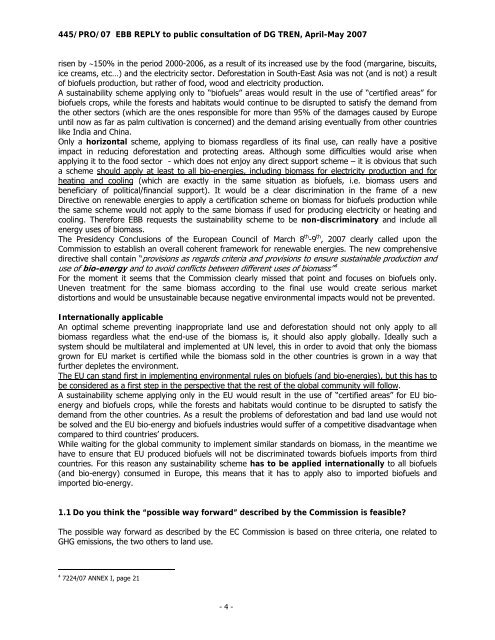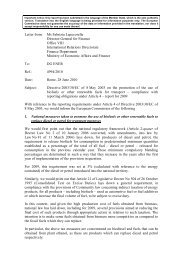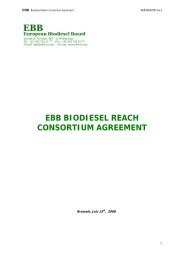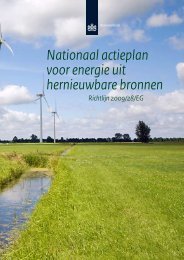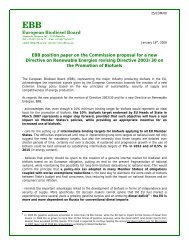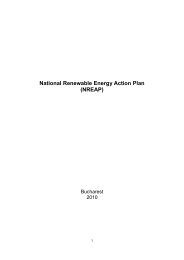EBB - European Biodiesel Board
EBB - European Biodiesel Board
EBB - European Biodiesel Board
You also want an ePaper? Increase the reach of your titles
YUMPU automatically turns print PDFs into web optimized ePapers that Google loves.
445/PRO/07 <strong>EBB</strong> REPLY to public consultation of DG TREN, April-May 2007<br />
risen by ∼150% in the period 2000-2006, as a result of its increased use by the food (margarine, biscuits,<br />
ice creams, etc…) and the electricity sector. Deforestation in South-East Asia was not (and is not) a result<br />
of biofuels production, but rather of food, wood and electricity production.<br />
A sustainability scheme applying only to “biofuels” areas would result in the use of “certified areas” for<br />
biofuels crops, while the forests and habitats would continue to be disrupted to satisfy the demand from<br />
the other sectors (which are the ones responsible for more than 95% of the damages caused by Europe<br />
until now as far as palm cultivation is concerned) and the demand arising eventually from other countries<br />
like India and China.<br />
Only a horizontal scheme, applying to biomass regardless of its final use, can really have a positive<br />
impact in reducing deforestation and protecting areas. Although some difficulties would arise when<br />
applying it to the food sector - which does not enjoy any direct support scheme – it is obvious that such<br />
a scheme should apply at least to all bio-energies, including biomass for electricity production and for<br />
heating and cooling (which are exactly in the same situation as biofuels, i.e. biomass users and<br />
beneficiary of political/financial support). It would be a clear discrimination in the frame of a new<br />
Directive on renewable energies to apply a certification scheme on biomass for biofuels production while<br />
the same scheme would not apply to the same biomass if used for producing electricity or heating and<br />
cooling. Therefore <strong>EBB</strong> requests the sustainability scheme to be non-discriminatory and include all<br />
energy uses of biomass.<br />
The Presidency Conclusions of the <strong>European</strong> Council of March 8 th -9 th , 2007 clearly called upon the<br />
Commission to establish an overall coherent framework for renewable energies. The new comprehensive<br />
directive shall contain “provisions as regards criteria and provisions to ensure sustainable production and<br />
use of bio-energy and to avoid conflicts between different uses of biomass” 4<br />
For the moment it seems that the Commission clearly missed that point and focuses on biofuels only.<br />
Uneven treatment for the same biomass according to the final use would create serious market<br />
distortions and would be unsustainable because negative environmental impacts would not be prevented.<br />
Internationally applicable<br />
An optimal scheme preventing inappropriate land use and deforestation should not only apply to all<br />
biomass regardless what the end-use of the biomass is, it should also apply globally. Ideally such a<br />
system should be multilateral and implemented at UN level, this in order to avoid that only the biomass<br />
grown for EU market is certified while the biomass sold in the other countries is grown in a way that<br />
further depletes the environment.<br />
The EU can stand first in implementing environmental rules on biofuels (and bio-energies), but this has to<br />
be considered as a first step in the perspective that the rest of the global community will follow.<br />
A sustainability scheme applying only in the EU would result in the use of “certified areas” for EU bioenergy<br />
and biofuels crops, while the forests and habitats would continue to be disrupted to satisfy the<br />
demand from the other countries. As a result the problems of deforestation and bad land use would not<br />
be solved and the EU bio-energy and biofuels industries would suffer of a competitive disadvantage when<br />
compared to third countries’ producers.<br />
While waiting for the global community to implement similar standards on biomass, in the meantime we<br />
have to ensure that EU produced biofuels will not be discriminated towards biofuels imports from third<br />
countries. For this reason any sustainability scheme has to be applied internationally to all biofuels<br />
(and bio-energy) consumed in Europe, this means that it has to apply also to imported biofuels and<br />
imported bio-energy.<br />
1.1 Do you think the “possible way forward” described by the Commission is feasible?<br />
The possible way forward as described by the EC Commission is based on three criteria, one related to<br />
GHG emissions, the two others to land use.<br />
4 7224/07 ANNEX I, page 21<br />
- 4 -


